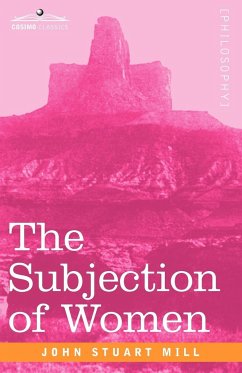When we further consider that to understand one woman is not necessarily to understand any other woman; that even if he could study many women of one rank, or of one country, he would not thereby understand women of other ranks or countries; and even if he did, they are still only the women of a single period of history; we may safely assert that the knowledge which men can acquire of women, even as they have been and are, without reference to what they might be, is wretchedly imperfect and superficial, and always will be so, until women themselves have told all that they have to tell. ¿from Chapter I One of the foremost figures of Western intellectual thought in the late 19th century, John Stuart Mill offered up examinations of human rights, personal and societal responsibilities, and the striving for individual happiness that continue to impact our philosophies, both private and political, to this day. This concise but explosive essay is perhaps the best example of how far-reaching¿and necessary on an ongoing basis¿his thinking was. Here, Mill puts forth the radical notion¿one still unaccepted among many to this day¿that women are not inherently inferior to men but that male dominance has molded a certain kind of behavior in them, and calls for the full equality of women not only before the law but in cultural and social reality as well. Written in 1861, not published till 1869, and still not fully heeded in the early 21st century, this is must-reading for anyone striving to understand the biases and inequities of Western culture. English philosopher and politician JOHN STUART MILL (1806¿1873) served as an administrator in the East Indian Company from 1823 to 1858, and as a member of parliament from 1865 to 1868. Among his essays on a wide range of political and social thought are Principles of Political Economy (1848), Considerations on Representative Government (1861), and Utilitarianism (1861).
Hinweis: Dieser Artikel kann nur an eine deutsche Lieferadresse ausgeliefert werden.
Hinweis: Dieser Artikel kann nur an eine deutsche Lieferadresse ausgeliefert werden.








